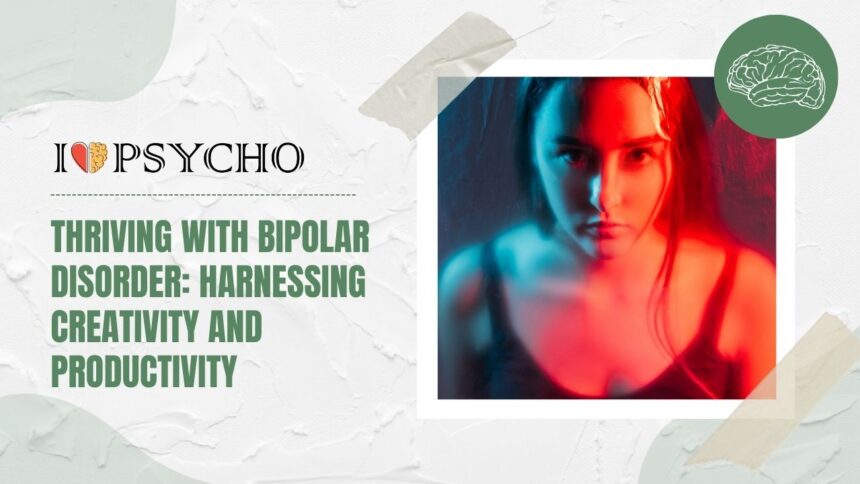Welcome to a world where creativity and productivity intersect with resilience and strength. In this blog post, we delve into the unique journey of thriving with bipolar disorder. Join us as we explore how individuals harness their creative potential while navigating the challenges of managing their mental health. Get ready to be inspired by stories of triumph, strategies for success, and insights on living a fulfilling life with bipolar disorder.
Understanding Bipolar Disorder
Bipolar disorder is a complex mental health condition characterized by extreme mood swings. Individuals with bipolar disorder experience episodes of mania, where they feel excessively energized and euphoric, followed by periods of depression, marked by intense sadness and hopelessness. These mood shifts can significantly impact daily functioning and relationships.
It’s important to recognize that bipolar disorder is not simply a choice or a personality trait; it’s a legitimate medical condition that requires understanding and support. People with bipolar disorder may struggle with stigma and misconceptions about their diagnosis, which can further complicate their journey towards wellness.
Treatment for bipolar disorder often involves a combination of therapy, medication, lifestyle changes, and support from healthcare professionals. By increasing awareness and fostering empathy for those living with bipolar disorder, we can create a more inclusive and compassionate society.
The Link Between Creativity and Bipolar Disorder
Many people with bipolar disorder have found that their condition is closely intertwined with their creativity. There seems to be a unique connection between the two, where periods of mania can spark bursts of creative energy and inspiration. This heightened emotional state can lead to innovative ideas and artistic expressions that may not have been possible otherwise.
On the flip side, during depressive episodes, individuals with bipolar disorder may struggle to find motivation or inspiration for creative pursuits. It’s important to recognize these fluctuations in mood and how they impact one’s ability to harness creativity. By understanding this link, those with bipolar disorder can better navigate their ups and downs while still tapping into their creative potential.
Creativity can serve as a powerful outlet for processing emotions and expressing thoughts that are difficult to articulate verbally. Engaging in artistic endeavors such as painting, writing, or music can provide a sense of catharsis and release pent-up feelings associated with bipolar symptoms.
Productivity Strategies for People with Bipolar Disorder
Living with bipolar disorder can present challenges when it comes to staying productive. One effective strategy is creating a structured daily routine. This helps establish a sense of stability and predictability in your day-to-day life. Breaking tasks into smaller, manageable chunks can make them feel less overwhelming and more achievable.
Utilizing technology like productivity apps or planners can help you stay organized and on track with your goals. Setting realistic expectations for yourself and prioritizing tasks based on importance can prevent feeling overwhelmed by the pressure to do everything at once.
Taking regular breaks throughout the day is crucial for maintaining focus and preventing burnout. Engaging in physical activity or mindfulness practices can also help manage stress levels and improve overall well-being.
Seeking support from loved ones or joining a support group can provide encouragement, accountability, and understanding during challenging times. Remember, productivity looks different for everyone – find what works best for you and embrace it as part of your unique journey towards success.
Coping Mechanisms and Self-Care for Managing Symptoms
Living with bipolar disorder can be challenging, but implementing coping mechanisms and self-care strategies is essential for managing symptoms. One effective way to cope is by establishing a daily routine that includes regular sleep patterns, exercise, and healthy meals. Additionally, practicing mindfulness techniques such as meditation or deep breathing can help regulate emotions and reduce stress levels.
Maintaining open communication with loved ones about your feelings and needs is crucial in building a strong support system. Setting boundaries and learning to say no when feeling overwhelmed can also prevent triggers from exacerbating symptoms. Engaging in hobbies or activities that bring joy and relaxation, whether it’s painting, gardening, or listening to music, can provide a much-needed escape from the challenges of bipolar disorder.
Seeking therapy or counseling to develop coping skills and address underlying issues is another valuable resource for managing symptoms effectively. Remember, self-care isn’t selfish; it’s necessary for maintaining mental well-being amidst the ups and downs of bipolar disorder.
The Positive Effects of Creative Outlets for Managing Bipolar
Living with bipolar disorder can be challenging, but finding creative outlets can offer a sense of relief and empowerment. Engaging in artistic activities like painting, writing, or music can provide a therapeutic escape from the highs and lows of the condition. Creativity allows individuals to express complex emotions that may be difficult to articulate verbally.
Creative projects offer a way to channel intense feelings into something tangible and meaningful. The process of creating art can promote mindfulness and help individuals stay present in the moment rather than getting caught up in racing thoughts. It provides a sense of accomplishment and boosts self-esteem when completing a project.
Exploring different forms of creativity enables individuals to discover new talents and interests they may not have realized they had. Whether it’s through dance, photography, or crafting, each person can find their unique way to connect with their inner selves.
Embracing creative outlets as part of managing bipolar disorder encourages self-discovery and personal growth. It fosters resilience by providing an emotional release valve during times of stress or instability. By incorporating creativity into daily life, individuals with bipolar disorder can cultivate a deeper understanding of themselves while enjoying the positive benefits that come with artistic expression.
Tips for Harnessing Creativity and Productivity with Bipolar Disorder
Living with bipolar disorder can present unique challenges when it comes to harnessing creativity and productivity. One tip is to establish a routine that incorporates self-care practices, such as exercise, meditation, or hobbies that bring joy. Setting realistic goals and breaking tasks into smaller steps can help manage overwhelm.
Embracing your creative side through outlets like painting, writing, or music can provide a healthy way to express emotions and channel energy positively. Experiment with different mediums to discover what resonates best for you. It’s essential to prioritize sleep and maintain a balanced diet as they play a crucial role in stabilizing mood fluctuations.
Seeking support from loved ones or joining peer-led groups can offer understanding and encouragement during challenging times. Remember to be gentle with yourself on difficult days and celebrate small victories along the way. By exploring various strategies and finding what works best for you, it’s possible to thrive creatively while managing bipolar disorder effectively.
Real Life Examples of Successful Individuals with Bipolar Disorder
Let’s explore some real-life examples of successful individuals who have thrived despite living with bipolar disorder.
One such example is the acclaimed singer-songwriter, Demi Lovato, who has been open about her struggles with bipolar disorder while continuing to create chart-topping music and advocate for mental health awareness.
Another inspiring figure is renowned artist Vincent van Gogh, whose masterpieces continue to be celebrated worldwide despite his battles with mental health issues, including suspected bipolar disorder.
Furthermore, Kay Redfield Jamison, a distinguished psychologist and author, has not only excelled in her career but also shared her personal journey with bipolar disorder through insightful books that have helped many others facing similar challenges.
These individuals demonstrate that having bipolar disorder does not define one’s potential for success or creativity; rather, it can serve as a source of strength and resilience in pursuing one’s passions and making a positive impact on the world.
Seeking Professional Help: Therapy, Medication, and Support Groups
Seeking professional help is a crucial step in managing bipolar disorder. Therapy provides a safe space to explore emotions and learn coping strategies. Cognitive-behavioral therapy can help challenge negative thought patterns that often accompany the disorder.
Medication prescribed by a psychiatrist can stabilize mood swings and manage symptoms effectively. It’s essential to work closely with a healthcare provider to find the right medication and dosage that works for you.
Support groups offer a sense of community and understanding from others who are going through similar experiences. Connecting with peers can reduce feelings of isolation and provide valuable insights into different coping mechanisms.
Remember, seeking professional help is not a sign of weakness but rather a proactive approach towards improving your mental health. It’s okay to ask for help when needed, as it shows strength and courage in facing challenges head-on.
Conclusion: Living a Fulfilling Life with Bipolar Disorder
Living a fulfilling life with bipolar disorder is not only possible but achievable. By understanding the condition, embracing creativity, implementing productivity strategies, practicing self-care, and seeking professional help when needed, individuals with bipolar disorder can thrive. Remember that managing symptoms and harnessing creativity go hand in hand. With the right tools and support system in place, it is entirely feasible to lead a fulfilling and meaningful life despite the challenges of bipolar disorder. Embrace your unique perspective and talents – they may just be the key to living a truly extraordinary life.









